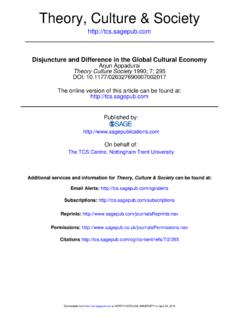Transcription of Grassroots Globalization and the Research Imagination
1 1 Grassroots Globalization andthe Research ImaginationArjun AppaduraiAnxieties of the Global lobalization is certainly a source of anxiety in the academic world. And the sources of this anxiety are many: Social scientists (especiallyeconomists) worry about whether markets and deregulation produce greaterwealth at the price of increased inequality. Political scientists worry that theirfield might vanish along with their favorite object, the nation-state, if globaliza-tion truly creates a world without borders. Cultural theorists, especially culturalMarxists, worry that in spite of its conformity with everything they already knewabout capital, there may be some embarrassing new possibilities for equity hid-den in its workings.
2 Historians, ever worried about the problem of the new, real-ize that Globalization may not be a member of the familiar archive of large-scalehistorical shifts. And everyone in the academy is anxious to avoid seeming to bea mere publicist of the gigantic corporate machineries that celebrate globaliza-tion. Product differentiation is as important for (and within) the academy as it isfor the corporations academics love to the academy there are quite different worries about Globalization thatinclude such questions as: What does Globalization mean for labor markets andPublic Culture12(1): 1 19 Copyright 2000 by Duke University PressThis essay draws on two previous publications by the author: The Research Ethic and theSpirit of Internationalism, Items(Social Science Research Council, New York) (December 1997)51(4), part I.
3 And Globalization and the Research Imagination , International Social Science Jour-nal(Blackwell/UNESCO) (June 1999) 160: 229 38. The author is grateful to the Open SocietyInstitute (New York) as well as to the Ford Foundation, the Social Science Research Council, andGfair wages? How will it affect chances for real jobs and reliable rewards? Whatdoes it mean for the ability of nations to determine the economic futures of theirpopulations? What is the hidden dowry of Globalization ? Christianity? Cyber-proletarianization? New forms of structural adjustment? Americanization dis-guised as human rights or as MTV?
4 Such anxieties are to be found in manynational public spheres (including that of the United States) and also in the acad-emic debates of scholars in the poorer the poor and their advocates the anxieties are even more specific:What are the great global agencies of aid and development up to? Is the WorldBank really committed to incorporating social and cultural values into its devel-opmental agenda? Does Northern aid really allow local communities to set theirown agendas? Can large banking interests be trusted to support microcredit?Which parts of the national state are protectors of stakeholding communities andwhich parts are direct affiliates of global capital?
5 Can the media ever be turned tothe interests of the poor? In the public spheres of many societies there is concern that policy debates occur-ring around world trade, copyright, environment, science, and technology set thestage for life-and-death decisions for ordinary farmers, vendors, slum-dwellers, mer-chants, and urban populations. And running through these debates is the sense thatsocial exclusion is ever more tied to epistemological exclusion and concern that thediscourses of expertise that are setting the rules for global transactions, even in theprogressive parts of the international system, have left ordinary people outside andbehind.
6 The discourse of Globalization is itself growing dangerously dispersed, withthe language of epistemic communities, the discourse of states and inter-state fora,and the everyday understanding of global forces by the poor growing steadily is thus a double apartheid evolving. The academy (especially in theUnited States) has found in Globalization an object around which to conduct itsspecial internal quarrels about such issues as representation, recognition, the end of history, the spectres of capital (and of comparison), and a host of debates, which still set the standard of value for the global professoriate,nevertheless have an increasingly parochial quality.
7 Thus the first form of this apartheid is the growing divorce between thesedebates and those that characterise vernacular discourses about the global,worldwide, that are typically concerned with how to plausibly protect culturalPublic Culture2 UNESCO for providing occasions for developing the ideas contained in this essay. Srilatha Batli-walla, Ben Lee, Achille Mbembe, Sheela Patel, Kenneth Prewitt, Toby Volkman, and my colleaguesin the Regional Worlds Project at the University of Chicago may recognize their provocations. Myfriends in SPARC (Bombay), especially Sheela Patel, might wish to regard it as a promissory and economic survival in some local, national, or regional sphere inthe era of reform and openness.
8 The second form of apartheid is that thepoor and their advocates find themselves as far from the anxieties of their ownnational discourses about Globalization as they do from the intricacies of thedebates in global fora and policy discourses surrounding trade, labor, environ-ment, disease, and warfare. But a series of social forms has emerged to contest, interrogate, and reversethese developments and to create forms of knowledge transfer and social mobi-lization that proceed independently of the actions of corporate capital and thenation-state system (and its international affiliates and guarantors).
9 These socialforms rely on strategies, visions, and horizons for Globalization on behalf of thepoor that can be characterised as Grassroots Globalization or, put in a slightlydifferent way, as Globalization from below. This essay is an argument for thesignificance of this kind of Globalization , which strives for a democratic andautonomous standing in respect to the various forms by which global power fur-ther seeks to extend its dominion. The idea of an international civil society willhave no future outside of the success of these efforts to globalize from in the study of these forms lies an obligation for academic Research that, ifhonored, might make its deliberations more consequential for the poorer 80 per-cent of the population of the world (now totalling 6 billion) who are socially andfiscally at take up this challenge to American academic thought about Globalization ,this essay moves through three arguments.
10 The first is about the peculiar opticalchallenges posed by the global. The second is about area studies the largestinstitutional epistemology through which the academy in the United States hasapprehended much of the world in the last fifty years. The third concerns the veryground from which academics typically and unwittingly speak the category of Research itself. These three steps bring me to a conclusion about the relationsbetween pedagogy, activism, and Research in the era of Optics of GlobalizationGlobalization is inextricably linked to the current workings of capital on a globalbasis; in this regard it extends the earlier logics of empire, trade, and politicaldominion in many parts of the world.



